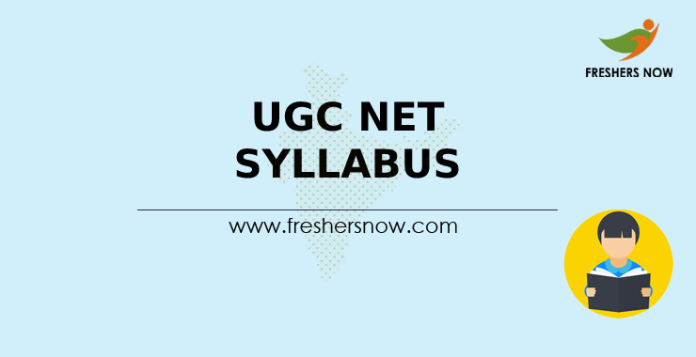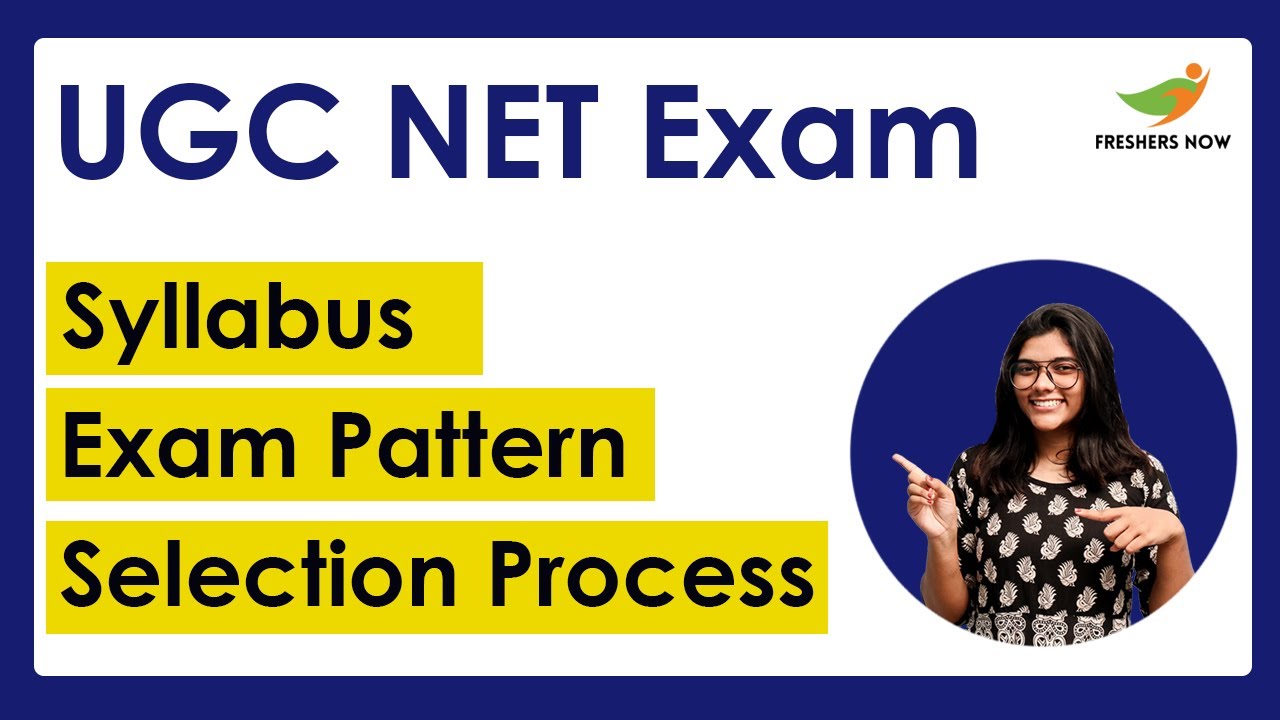UGC NET Syllabus 2025 & Exam Pattern PDF Download: Get the latest updates on the UGC NET Exam Syllabus 2025 right here in this article. All candidates who have applied for the UGC NET Exam 2025 can check this page to find the complete syllabus and exam pattern. The officials are planning to conduct the exam as per the announced schedule. To help you prepare better, we have shared all the important details about the UGC NTA NET Syllabus 2025 and Exam Pattern on this page. You can also find the direct link to download the syllabus PDF at the end of this page.
The exam has two papers, both with objective multiple-choice questions. It will be held as a Computer Based Test (CBT) with 150 questions in total. Candidates will have 3 hours (180 minutes) to complete the exam. The subjects covered include Reasoning Ability, Reading Comprehension, Divergent Thinking, General Awareness, and the concerned subjects. The exam carries 300 marks in total, with no negative marking. The question paper will be available in English and Hindi, and each question is worth 2 marks.
UGC NET Syllabus 2025 – Overview
| Latest UGC NET Syllabus 2025 & Exam Pattern PDF Download | |
| Name of the Organization | National Testing Agency (NTA) |
| Exam Name | National Eligibility Test (NET) |
| Category | Entrance Exam Syllabus |
| Official Website | ugc.ac.in |
UGC NET Exam Pattern 2025
This section will give you an update regarding the UGC NET Exam Pattern 2025 for all the candidates who are searching all over the internet. This UGC NET Exam Pattern 2025 will help the students understand the paper structure and how the question paper will be in the examination. Moreover, it will also help you in getting an idea of the total number of questions, the total number of marks, subject names, and the time duration of the exam. Knowing these details will help in getting the highest score in the examination and also help in time management. Candidates can prepare a timetable and get started with their exam preparation.
| Paper | Name of the Subject | No of Questions | Max Marks |
| Paper I | The questions in the Paper I intend to assess the teaching/ research aptitude of the candidate. It will primarily be designed to test reasoning ability, reading comprehension, divergent thinking and general awareness of the Candidate |
50 questions | 100 marks |
| Paper-II | This is based on the subject selected by the candidate and will assess domain knowledge |
100 questions | 200 marks |
| Total | 150 Questions | 300 Marks | |
| Duration: 180 Minutes | |||
Marking Scheme
(a) Each question carries 02 (two) marks.
(b) For each correct response, the candidate will get 02 (2) marks.
(c) There is no negative marking for incorrect response.
(d) No marks will be given for questions un-answered/ un-attempted/ marked for Review.
UGC NET Syllabus 2025 PDF
The UGC NET Syllabus 2025 plays an important role in the exam as it helps in understanding the chapters that are included in the exam which are to be prepared by the applicants. We have given the complete UGC NTA NET Syllabus 2025 here on this page for easy preparation. This UGC Syllabus 2025 is collected from the official site and for more queries aspirants can also visit the official site. Knowing the topics and sub-topics will help in getting a good score on the examination. Check out the direct link below and download the UGC NET Exam Syllabus 2025 in a PDF. The pdf contains all the topics and sub-topics for every subject which will be very useful for all the candidates taking the exam.
Paper I General Paper on Teaching and Research Aptitude
Unit 1 Teaching Aptitude
- Teaching: Concept, Objectives, Levels of teaching (Memory, Understanding, and Reflection), Characteristics, and basic requirements.
- Learner’s characteristics: Characteristics of adolescent and adult learners (Academic, Social, Emotional, and Cognitive), Individual differences.
- Factors affecting teaching related to Teacher, Learner, Support material, Instructional facilities, Learning environment, and Institution.
- Methods of teaching in Institutions of higher learning: Teacher-centered vs. Learner-centered methods; offline vs. Online methods (Swayam, Swayamprabha, MOOCs, etc.).
- Teaching Support System: Traditional, Modern, and ICT-based.
- Evaluation Systems: Elements and Types of evaluation, Evaluation in Choice Based Credit System in Higher education, Computer-based testing, Innovations in evaluation systems.
Unit 2 Research Aptitude
- Research: Meaning, Types, and Characteristics, Positivism and Postpositivistic approach to research.
- Methods of Research: Experimental, Descriptive, Historical, Qualitative, and Quantitative Methods.
- Steps of Research.
- Thesis and Article writing: Format and styles of referencing.
- Application of ICT in research.
- Research ethics.
Unit 3 Comprehension
- A passage of text is given. Questions are asked from the passage to be answered.
Unit 4 Communication
- Communication: Meaning, types, and characteristics of communication.
- Effective communication: Verbal and Non-verbal, Inter-Cultural and group communications, Classroom communication.
- Barriers to effective communication.
- Mass-Media and Society.
Unit 5 Mathematical Reasoning and Aptitude
- Types of reasoning.
- Number series, Letter series, Codes, and Relationships.
- Mathematical Aptitude (Fraction, Time & Distance, Ratio, Proportion, and Percentage, Profit and Loss, Interest and Discounting, Averages, etc.).
Unit 6 Logical Reasoning
- Understanding the structure of arguments: argument forms, the structure of categorical propositions, Mood and Figure, Formal and Informal fallacies, Uses of language, Connotations, and denotations of terms, and the Classical square of opposition. Evaluating and distinguishing deductive and inductive reasoning. Analogies.
- Venn diagram: Simple and multiple uses for establishing the validity of arguments.
- Indian Logic: Means of knowledge.
- Pramanas: Pratyaksha (Perception), Anumana (Inference), Upamana (Comparison), Shabda (Verbal testimony), Arthapatti (Implication), and Anupalabddhi (Nonapprehension).
- Structure and kinds of Anumana (inference), Vyapti (invariable relation), and Hetvabhasas (fallacies of belief).
Unit 7 Data Interpretation
- Sources, acquisition, and classification of Data.
- Quantitative and Qualitative Data.
- Graphical representation (Bar-chart, Histograms, Pie-chart, Table-chart, and Line-chart) and mapping of Data.
- Data Interpretation.
- Data and Governance.
Unit 8 Information And Communication Technology (ICT)
- ICT: General abbreviations and terminology.
- Basics of the Internet, Intranet, E-mail, Audio, and Video-conferencing.
- Digital initiatives in higher education.
- ICT and Governance.
Unit 9 People, Development and Environment
- Development and environment: Millennium development and Sustainable development goals.
- Human and environment interaction: Anthropogenic activities and their impacts on the environment.
- Environmental issues: Local, Regional, and Global; Air pollution, Water pollution, Soil pollution, Noise pollution, Waste (solid, liquid, biomedical, hazardous, electronic), Climate change and its Socio-Economic and Political dimensions.
- Impacts of pollutants on human health. Natural and energy resources: Solar, Wind, Soil, Hydro, Geothermal, Biomass, Nuclear, and Forests.
- Natural hazards and disasters: Mitigation strategies.
- Environmental Protection Act (1986), National Action Plan on Climate Change, International agreements/efforts -Montreal Protocol, Rio Summit, Convention on Biodiversity, Kyoto Protocol, Paris Agreement, International Solar Alliance.
Unit 10 Higher Education System
- Institutions of higher learning and education in ancient India.
- Evolution of higher learning and research in post-independence India.
- Oriental, Conventional, and Non-conventional learning programs in India.
- Professional, Technical, and Skill-Based Education.
- Value education and environmental education.
- Policies, Governance, and Administration.The The
The paper 2 Syllabus is as follows:
- 00 General Paper on Teaching & Research Aptitude (Paper -I)
- 01 Economics / Rural Economics /Co-operation / Demography / Development Planning/ Development Studies / Econometrics/ Applied Economics/Development Eco./Business Economics
- 02 Political Science
- 03 Philosophy
- 04 Psychology
- 05 Sociology
- 06 History
- 07 Anthropology
- 08 Commerce
- 09 Education
- 10 Social Work
- 11 Defence and Strategic Studies
- 12 Home Science
- 14 Public Administration
- 15 Population Studies
- 16 Music
- 17 Management (including Business Admin. Mgt./ Marketing/ Marketing Mgt./ Industrial Relations and Personnel Mgt./ Personnel Mgt./ Financial Mgt./ Co-operative Management)
- 18 Maithili
- 19 Bengali
- 20 Hindi Download
- 21 Kannada
- 22 Malayalam
- 23 Oriya
- 24 Punjabi
- 25 Sanskrit
- 26 Tamil
- 27 Telugu
- 28 Urdu
- 29 Arabic
- 30 English
- 31 Linguistics
- 32 Chinese
- 33 Dogri
- 34 Nepali
- 35 Manipuri
- 36 Assamese
- 37 Gujarati
- 38 Marathi
- 39 French (French Version)
- 40 Spanish
- 41 Russian
- 42 Persian
- 43 Rajasthani
- 44germann
- 45 Japanese
- 46 Adult Education/ Continuing Education/ AndragogyNon-Formall Education.
- 47 Physical Education
- 49 Arab Culture and Islamic Studies
- 50 Indian Culture
- 55 Labour Welfare/ Personnel Management/ Industrial Relations/ Labour and Social Welfare/ Human Resource Management
- 58 Law
- 59 Library and Information Science
- 60 Buddhist, Jaina, Gandhian, and Peace Studies
- 62 Comparative Study of Religions
- 63 Mass Communication and Journalism
- 65 Performing Art – Dance/Drama/Theatre
- 66 Museology & Conservation
- 67 Archaeology
- 68 Criminology
- 70 Tribal and Regional Language/ Literature
- 71 Folk Literature
- 72 Comparative Literature
- 73 Sanskrit traditional subjects (including) Jyotisha/ Sidhanta Jyotish/ Navya Vyakarna/ Vyakarna/ Mimansa/ Navya Nyaya/ Sankhya Yoga/ Tulanatmaka Darsan/ Shukla Yajurveda/ Madhav Vedant/ Dharmasasta/ Sahitya/ Puranotihasa / Agama). Download
- 74 Women Studies
- 79 Visual Art (including Drawing & Painting/Sculpture Graphics/Applied Art/History of Art)
- 80 Geography
- 81 Social Medicine & Community Health
- 82 Forensic Science
- 83 Pali
- 84 Kashmiri
- 85 Konkani
- 87 Computer Science and Applications
- 88 Electronic Science Download
- 89 Environmental Sciences Download
- 90 Politics including International Relations/ International Studies including Defence/ Strategic Studies, West Asian Studies, South East Asian Studies, African Studies, South Asian Studies, Soviet Studies, and American Studies.
- 91 Prakrit
- 92 Human Rights and Duties
- 93. Tourism Administration and Management.
- 94. Bodo Download
- 95. Santali Download
- 100. Yoga
- 101. Sindhi
- 102. Hindu Studies
- 103. Indian Knowledge System
- 104. Disaster Management
- 105. Ayurveda Biology
UGC NET Syllabus 2025 & Exam Pattern Link
| UGC NET Syllabus 2025 & Exam Pattern Download Link | |
| To Check And Download the UGC NET Exam Syllabus 2025 | Check Syllabus |
| To Check And Download the UGC NET Exam Pattern | Check Syllabus |
We hope you got the data you were looking for regarding the UGC NET Syllabus & Exam Pattern 2025 for more keep checking our site, Exams.Freshersnow.Com.





